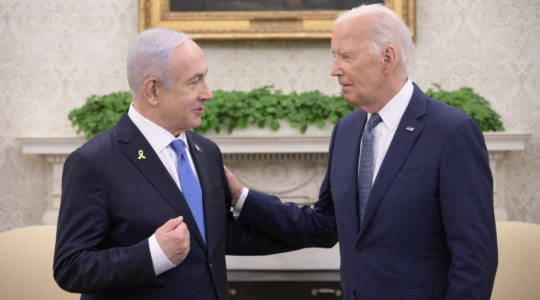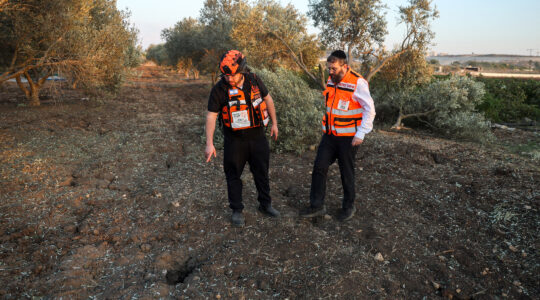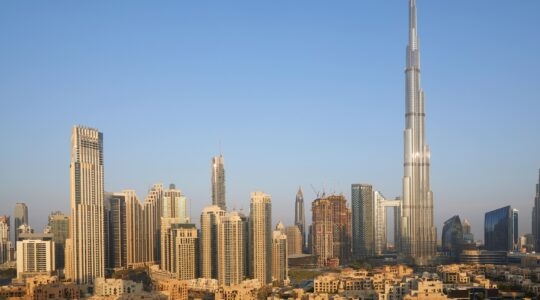JERUSALEM, Dec. 4 (JTA) — Deeply troubled by menacing Hezbollah-led mass demonstrations in Beirut, Israel has been weighing what it can do to help prevent Lebanon’s moderate government from falling.
Israeli Prime Minister Ehud Olmert sees the showdown between Sheik Hassan Nasrallah’s Shi’ite Hezbollah and the mainly Sunni anti-Syrian “March 14 coalition” allied to Prime Minister Fuad Siniora as a microcosm of the regional struggle for hegemony between Iran-led radicals and Western-leaning moderates — and the outcome will be crucial for Israel’s future in the region.
Olmert fears that victory for the radicals in Lebanon will undo most of the gains Israel made in the war with Hezbollah this summer.
To stem the tide of Shi’ite radicalism, Olmert intends to work with the United States and moderate Arab regimes such as Egypt, Saudi Arabia and Jordan that are equally concerned by the prospect of rising Shi’ite power. He also is considering making gestures to Lebanon for which Siniora will be able to take the credit.
Israeli intelligence services are unanimous in their conviction that Iran and Syria are behind the unrest in Beirut in an effort to reverse the results of last summer’s war. Before the war, both Iran and Syria were in a position to strike at Israel through their Hezbollah proxy based in southern Lebanon near Israeli towns and villages. The area served as a major base for Hezbollah rockets ready for launching at a moment’s notice.
The war changed that equation.
Though the Israeli army failed to eradicate Hezbollah, U.N. Security Council Resolution 1701, which brought the fighting to an end, effectively removed Hezbollah rockets from southern Lebanon, blunting the Iranian-Syrian capacity to strike at Israel.
Now the unrest in Lebanon could bring back Iran and Syria with a vengeance: According to most Israeli analysts, if the Siniora government falls, Resolution 1701 is likely to be the first casualty.
If Siniora backs down and gives Hezbollah the six seats it is demanding in his Cabinet, the Shi’ites will have veto power over government decisions. Alternatively, if Siniora resigns, sparking elections, the analysts maintain that Hezbollah almost certainly will increase its power in Parliament and government.
In both cases, the upshot is likely to be the end of effective multinational policing of southern Lebanon by U.N. forces as mandated by Resolution 1701. In a best-case scenario, Hezbollah would simply ignore the UNIFIL personnel. In the worst case Hezbollah might target them, the way it did American and French forces in the early 1980s, forcing them to pull out of Lebanon.
The resolution’s embargo on arms supplies to Hezbollah, which in today’s virtually optimal conditions is being violated on a small scale, would be rendered meaningless, the analysts maintain.
That’s an Israeli nightmare: Hezbollah rearmed, back in southern Lebanon in force. In that event, Iran again would be able to threaten Israel with massive rocket attacks from Lebanon if Israel or the U.S. takes military action against Iran’s nuclear program. In other words, the Iranians again would be able to use their Hezbollah card to deter Israel from trying to stop Iran from going nuclear.
But it’s not only a case of Iran protecting its nuclear weapons program. Israeli decision-makers see the confrontation in Lebanon as part of a wider battle for hegemony in the Middle East. If Iran is able to spread its influence through Syria and Lebanon to the eastern Mediterranean, it would have major regional implications.
As one Israeli Cabinet minister put it, “If Hezbollah gains sway in Beirut, Lebanon will become the first Iranian protectorate.”
Eyal Zisser, a Tel Aviv University expert on Lebanon, sees three big losers if Hezbollah gains the upper hand. First is the so-called “coalition of March 14,” the Lebanese forces that came out strongly against Syria and for democracy after former Prime Minister Rafik Hariri’s assassination in February 2005.
Next is Israel, which would discover that “it had managed to push Hezbollah back from the border in the North, only to find it becoming the king maker in Lebanese politics,” in Zisser’s words.
Third is the United States because if Siniora falls, “it will mark the end of America’s adventure in Lebanon, influence the way the U.S. pulls out of Iraq and signify the end of President Bush’s vision of a new, democratic Middle East,” Zisser said.
Bush liked to cite Lebanon as an example of the success of his democratization policy, but if Siniora falls, that argument no longer will be available.
To arrest the process of radicalization in Lebanon and the wider Middle East, Israel would like to help stabilize the Siniora government, build a pro-American alliance with moderate Sunni countries as a bulwark against Iranian influence and detach Syria from the Iranian axis. The trouble is that everything on this wish list is likely to prove very difficult.
Helping Siniora is a delicate matter because overt moves by Israel in that direction could have the opposite effect. In a special Cabinet meeting Sunday, Foreign Minister Tzipi Livni warned her colleagues against speaking about helping the embattled Lebanese leader.
“That’s the last thing he needs,” she said.
Still, Israel is considering making two good-will gestures to Lebanon. One is allowing U.N. forces to take security responsibility for the village of Ghajar, bisected by the Israeli-Lebanon border, the first step toward the village’s eventual return to Lebanon.
Israel also is urging the United Nations to redefine the Shebaa Farms portion of the Golan Heights as Lebanese, not Syrian territory, so Israel can hand the area to the central government in Beirut. The idea is that Siniora would get credit for these moves, even if Israel denies making them for his benefit.
On the Israeli right, leaders like the National Union-National Religious Party’s Effie Eitam say such gestures will weaken Israel’s standing, and the army should prepare for war. Eitam argues that for much the same reasons that Israel went to war last July — to break Hezbollah and undermine Iranian influence — it should return to war now. This time, however, it should take the time to plan its operation and train its troops for the missions at hand, he said.
The summer war led to significant gains for Israel in Lebanon and in the balance of power with Iran. The question facing the country’s decision-makers: What can they do to maintain them in the face of Hezbollah’s push to alter the balance of power in Lebanon?

Help ensure Jewish news remains accessible to all. Your donation to the Jewish Telegraphic Agency powers the trusted journalism that has connected Jewish communities worldwide for more than 100 years. With your help, JTA can continue to deliver vital news and insights. Donate today.





